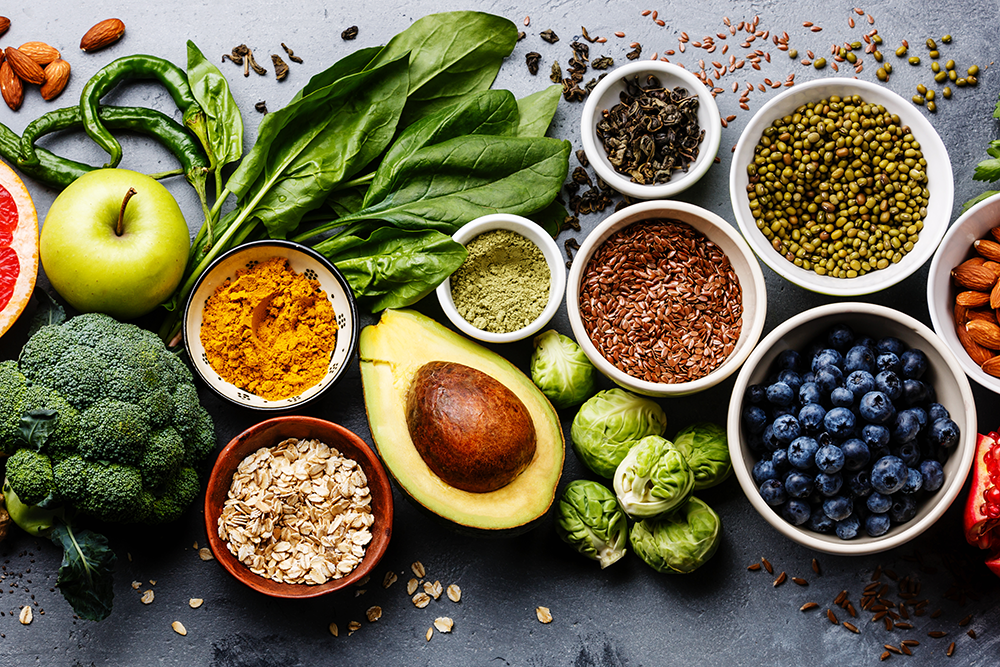Eating well isn’t just about keeping our bodies healthy and in shape. Food is also fuel for our brains! As we age, our memory can inevitably slow down as well, leaving us feeling forgetful or absent-minded. Although there is no single diet that can help protect against age-related diseases such as Alzheimer’s or dementia, we can still make sure we’re giving our brains all the nutrients necessary for helping maintain cognitive function.
So what does a healthy, well-balanced diet look like? Include these ten foods as a regular staple, and it may help to keep your memory and concentration sharp and focused.
1. Whole Grains
Energy keeps our bodies moving and functioning: nothing on this earth can function without the proper amount of energy. The ability to concentrate and focus stems from an adequate supply of energy. In our bodies, this comes in the form of glucose, carried in our blood to our brains. Whole grains have a low GI, meaning they release energy slowly into the bloodstream. Because of this, we are able to get a steady supply all throughout the day. To incorporate this into your diet, be sure to choose brown whole grains such as cereals, granary bread, rice, and pasta.
2. Oily Fish
Our bodies are incapable of creating essential fatty acids (EFAs) by themselves and they can only be obtained through the food we eat. Omega-3 fats (DHA and EPA) occur naturally in oily fish, such as salmon, trout, mackerel, herring, and sardines. However, you can find a good plant source in flaxseed, soya beans, pumpkin seeds, and walnuts. You can also pick up Omega-3 or fish oil supplements from your local pharmacy.
Low levels of DHA have been linked to an increased risk of dementia, Alzheimer’s disease, and memory loss. Having the appropriate levels of DHA and EPA in your body has also been shown to help us manage stress and boost serotonin.
3. Blueberries
If you’re in need of a short-term memory boost, add some blueberries to your diet! Fruits are naturally sweet and delicious, so blueberries make a great snack and can even be added to your favorite pancake or muffin recipe. Either way you slice it, blueberries and other dark red and purple fruits, like blackberries, are good for us. They also contain protective compounds called anthocyanins. Anthocyanins have a multitude of health benefits, including helping boost short-term brain function and lowering blood pressure.
4. Tomatoes
There is a powerful antioxidant present in tomatoes called lycopene. It is responsible for helping protect against the type of free radical damage that can occur to brain cells during the development of dementia and Alzheimer’s disease. Cooked tomatoes are recommended, especially if you add a little olive oil to help bolster the body’s absorption. If you’re not a fan of tomatoes, you can all also try papaya, watermelon, or pink grapefruit as well.

5. Eggs
Vitamin B is incredibly important to brain health, especially B6, B12, and folic acids, as they work together to reduce the levels of homocysteine in our blood. Too much homocysteine can lead to an increased risk of stroke, as well as cognitive impairment.
Eggs, chicken, fish, dairy, and leafy greens are rich in Vitamin B. Egg yolks especially contain B1, B3, and choline, which is essential for getting the memory-boosting chemical, acetylcholine, into your bloodstream.
6. Blackcurrants
Blackcurrants, red peppers, oranges, and broccoli all have one key thing in common: they are an excellent source of Vitamin C. As we age, our mental agility can weaken, and some research has shown that a deficiency of Vitamin C can be a risk factor for age-related brain degeneration, including dementia and Alzheimer’s. Adding these foods into your diet can help curb some of these onsets, as well as aiding in managing anxiety and stress.
7. Pumpkin Seeds
While many seeds contain zinc, pumpkin seeds are the most potent and are packed full of the essential mineral that is vital for enhancing memory and thinking skills. In pumpkin seeds, you will also find magnesium, which is great for reducing stress, as well as B vitamins and tryptophan, which help us produce serotonin. If seeds aren’t your thing, you can also find these vitamins and minerals in beef, oysters, and chickpeas.
8. Broccoli
Long dubbed a ‘superfood’, broccoli has many health benefits. Rich in Vitamin K, this leafy green is known to enhance cognitive function and improve brain power. Research has shown that since broccoli is also high in compounds called glucosinolates, it can aid in slowing the breakdown of acetylcholine, which is a neurotransmitter located in our central nervous system. We need this to help our central nervous system perform properly and it keeps our brains and memories sharp. Other than broccoli, you can also check out cauliflower, kale, cabbage, and Brussels sprouts for a good source of Vitamin K.
9. Sage
While sage is often thought of as an essential oil, adding fresh sage to your diet can help improve memory and concentration. Use sage in dishes such as butternut soup, sage risotto, or various pasta recipes and sauces to amp up the flavor and to give your brain a little boost.
10. Nuts
Various studies have suggested that an optimal intake of Vitamin E, especially in seniors, can help prevent cognitive decline. Vitamin E can help protect healthy brain function. Other than nuts, this vitamin can be found in asparagus, olives, seeds, and eggs.
Keeping a varied diet is crucial no matter what age you are, and incorporating these foods into your diet can go a long way with aiding in stabilizing and protecting cognitive health. Here at Kingsley in our Canton senior living community, we know how important memory function is, and strive to offer a variety of balanced, healthy meal options for our residents to keep both their bodies and their minds thriving and well.
To find out more information about Kingsley and to find out how we can help you or your loved one, be sure to contact us today.






